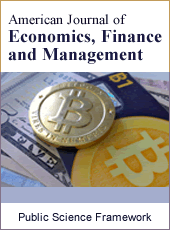American Journal of Economics, Finance and Management
Articles Information
American Journal of Economics, Finance and Management, Vol.3, No.6, Dec. 2017, Pub. Date: Dec. 9, 2017
The Giffen Goods Phenomenon in the Austrian School Perspective
Pages: 56-62 Views: 3275 Downloads: 1548
[01]
Er'el Granot, Department of Electrical and Electronics Engineering, Ariel University, Ariel, Israel.
The Giffen good was used to attack Praxeology and the Austrian school of economics. It is shown that with a specific value scale along with pure Austrian analysis the existence of Giffen goods can be predicted. It is explained that the traditional Rothbardian's methods to investigate human preference and action is inadequate to analyze preferences between complex bundles of goods, which is required in the analysis of Giffen goods. Therefore, the Rothbardian's preference schedule table is replaced with a two-dimensional ranking matrix, which takes into account all the possible bundles of goods. It is shown that under Austrian analysis, without utility functions and indifference curves, at least in theory, under certain conditions (specific preference schedule and money restrictions) an upper sloping demand curve, which is a fingerprint of Giffen goods, is possible. Therefore, not only doesn't the existence of Giffen goods contradict Austrian economics, but Austrian economics can predict the existence of Giffen goods.
Giffen Good, Austrian School, Giffen Paradox, Subjective School, Rothbard, Preference Schedule
[01]
G. Mankiw, Principles of Economics. South-Western Cengage Learning. (2007).
[02]
G. J. Stigler, "Notes on the history of the Giffen paradox", The Journal of Political Economy, 55, pp. 152-156 (1947).
[03]
The first citation appears in: A. Marshall, Principles of Economics. (First ed.). London: Macmillan (1890).
[04]
E. Masuda and P. Newman, "Gray and Giffen Goods". The Economic Journal. 91, 364, (1981).
[05]
J. R. Hicks, Value and Capital, 2nd ed. Oxford University Press (1946).
[06]
M. Friedman, "The Marshallian demand curve" Journal of Political Economy, 57 463-495 (1949).
[07]
L. J. Savage, "The utility analysis of choices involving risk." Journal of Political Economy, 56, 277-290 (1948).
[08]
R. Heiner "A reformation of the law of demand" Economic Inquiry, 12, 577-583 (1974).
[09]
W. R. Dougan, "Giffen goods and the law of demand", Journal of Political Economy, 90, 809-815 (1982).
[10]
G. P. Dwyer and C. M. Lindsay, "Robert Giffen and the Irish potato" American Economic Review, 74, 188-192 (1984).
[11]
Y. Barzel and W. Suen, "The demand curves for Giffen goods are downward sloping" The Economic Journal, 102, 896-905 (1992).
[12]
S. Baruch and Y. Kannai, "Inferior goods, Giffen goods, and Shochu", chapter in Economics Essays, Eds. G. Debreu et al. pp.9-17 (Springer-Verlag, Berlin Heidelberg 2001).
[13]
R. T. Jensen and N. H. Miller, "Giffen behavior and subsistence consumption", American Economic Review, 98, 1553-77 (2008).
[14]
C. Read (2013), Giffen behaviour in Irish famine markets: an empirical study, No 15, Working Papers, Department of Economic and Social History at the University of Cambridge, http://EconPapers.repec.org/RePEc:cmh:wpaper:15.
[15]
R. T. Jensen, and N. H. Miller, " The impact of food price increases on caloric intake in China" Agricultural Economics 39, 465–476 (2008).
[16]
R. T. Jensen, N. H. Miller, "Giffen Behavior: Theory and Evidence", National Bureau of Economic Research (NBER) Working Paper No. 13243 (2007) http://www.nber.org/papers/w13243
[17]
W. E. Block, "Thymology, Praxeology, Demand Curves, Giffen Goods and Diminishing Marginal Utility", Studia Humana Volume 1:2, 3-11 (2012).
[18]
W. Block, and W. Barnett, II, "Giffen goods, Backward bwnding supply curves, price controls and praxeology; or, Who's afraid of the big bad boogie man of Giffen goods and backward bending supply curve? Not us" Procesos de Mercado: Revista Europea de Economía Política Vol. IX, no. 1, pp. 353-373, (2012).
[19]
P. G. Klein, J. T. Salerno "Giffen’s Paradox and the Law of Demand", Austrian Economics Overview (2010). https://mises.org/library/giffen%E2%80%99s-paradox-and-law-demand
[20]
L. von Mises, Human Action: A Treatise on Economics. Yale University Press, Ludwig von Mises Institute (1949).
[21]
M. N. Rothbard, Man Economy and State, Ludwig von Mises Institute, Scholar's Edition, second edition (2009).
[22]
E. Granot "Ricardo's law of comparative advantage and the Law of Association: a subjective analysis." Chapter 3 in Economics and Development. (INTECH, Rijeka 2017).
[23]
E. Granot, "The Roll of the Entrepreneur in the Establishment of Economic Equilibria" to be published in the book Entrepreneurship (INTECH, Rijeka 2018).
[24]
J. von Neumann, and O. Morgenstern, Theory of Games and Economic Behavior. Princeton, NJ. (Princeton University Press, 1953).

ISSN Print: 2381-6864
ISSN Online: 2381-6902
Current Issue:
Vol. 5, Issue 3, September Submit a Manuscript Join Editorial Board Join Reviewer Team
ISSN Online: 2381-6902
Current Issue:
Vol. 5, Issue 3, September Submit a Manuscript Join Editorial Board Join Reviewer Team
| About This Journal |
| All Issues |
| Open Access |
| Indexing |
| Payment Information |
| Author Guidelines |
| Review Process |
| Publication Ethics |
| Editorial Board |
| Peer Reviewers |


